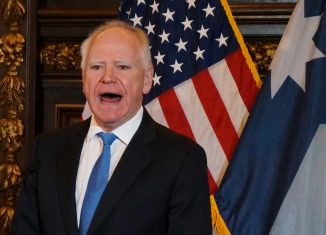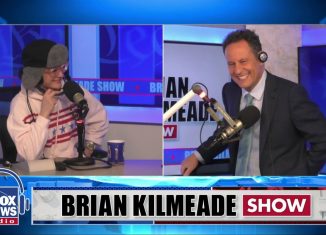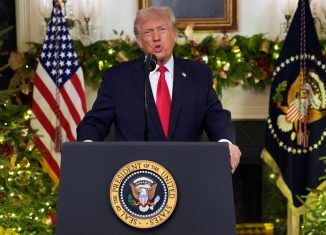
Congressman Doug Collins (R-GA), Ranking Member of the House Judiciary Committee, joined Brian Kilmeade to discuss the letter Judiciary Chairman Jerry Nadler sent President Trump telling the President that he and his legal team are welcome to participate in the public impeachment hearings in the Judiciary Committee on Wednesday, December 4. Collins said he is so disappointed in Chairman Nadler for convening next week’s public hearing he can hardly put it into words. Collins does not yet know who the Republicans or Democrats plan on calling as witnesses at the hearing and believes nobody would fault President Trump if he does not send anyone on his behalf to participate in the hearing. When asked if his opinion has changed after recent reports that President Trump only released the aid to Ukraine after he was informed about the whistleblower, Collins said no because the President did not do anything wrong.
Plus, Congressman Collins on being humbled by President Trump’s support for him to be appointed to fill the seat being vacated by retiring Senator Johnny Isakson and reports that Georgia Governor Brian Kemp (R) prefers Atlanta businesswoman and co-owner of the Atlanta Dream, Kelly Loeffler.
Watch here:
Full transcript below:
Brian Kilmeade: Last week, I asked the ranking member, “Do you know what’s going on with impeachment?” He said, “I don’t know.” I said, “Did you ask Jerry Nadler?” He said, “Yeah, he doesn’t know.” Now he knows. Joining us now, Congressman Doug Collins off the treadmill. Hi, Congressman.
Doug Collins: Hi, Brian. How are you, bud?
Brian Kilmeade: You were running this morning doing our show, right?
Doug Collins: I did. I was out there running, get me through it. Got me through about three miles or so. Got to work off this Thanksgiving potbelly, here.
Brian Kilmeade: Yeah. You have like zero percent body fat, but —
Doug Collins:
Brian Kilmeade: — now you’re the ranking member. Can you tell our audience, Congressman, what we’re going to be looking at next week?
Doug Collins: Next week? I am so disappointed in Chairman Nadler; I can’t even properly put words to it. But what we’re going to see next week is the judiciary, where the Democrats promise would be a fair process for the president, for everybody involved, and to sort of handle the Schiff-show fiasco, is we’re going to have next week, a made for television event in which you’re going to have academics who are media commentators on other more liberal networks, typically, who are going to come on, and they’re going to tell us, “Oh, well, this is possibly an impeachable offense.”.
Really, this is an affront to the American people. We’ve been waiting for what their determination as to what the president did wrong. We found nothing. And now we’re going to use our valuable time to have academics tell us what they think an impeachable offense is. Why don’t we actually have Adam Schiff? How do we have — you have a fact witness who dealt with a whistleblower, his staff or others, coming under — and testify under oath to what they actually knew and what they actually didn’t know. This is a disgrace. But this is the way — I mean, the whole thing is it is a smoke and mirrors because they have nothing on the president.
Brian Kilmeade: So, Congressman, who you guys calling?
Doug Collins: It looks like right now — we’re filming the final debate, but we’ve got one, I’ll be able to — we haven’t announced yet, but I’ll announce it later. But we have one more that’s coming.
Brian Kilmeade: Do you know who they are calling?
Doug Collins: No. We haven’t found out yet. But will if — this is an interesting thing, Brian, do you realize that this is a rerun of the same basically hearing we had in June.
Brian Kilmeade: No.
Doug Collins: We’ve had this hearing before. We’ve had this hearing before, and, you know, but there’s a difference here. And I think it’s interesting to note and I sort of made this — I made this, you know, discussion before. But what we saw with Mr. Goldman last week, what we see with, you know, Norm Eisen and Barry and the embassy in our committee, that paid consultants, what I call “Bring a Donor to Workday” and get to ask questions. If you’re a large enough donor to the Democratic Party, you get to ask questions in a committee hearing. What we thought last week, and then we’re going to see this week, it didn’t allow their counsels to ask these questions, you know, and make it look like this formal proceeding to get to the president.
But actually, I have a question. How is having academics talk about impeachment actually giving the president any way to question those who have accused him? It doesn’t. And so, I think this is the problem we’re having in this whole show is they don’t know what to do. And it’s almost as bad as last week when Jerry Nadler didn’t know what he was doing. Now we know what he’s doing, and he might as well just not have had anything.
Brian Kilmeade: So, a letter from Nadler, here’s an excerpt. “I’m hopeful that you and your counsel” — meaning the president — “will opt to participate in the committee hearing consistent with the rules of decorum and with the solemn nature of the work before us.” So, they’re asking the president to go. Should he?
Doug Collins: I think that if the president wants to, he’s more than welcome to come to this sideshow that we’re going to have next week. If he doesn’t send an attorney or someone from his legal counsel, I don’t think anybody would fault him, because this is a farce. This is something that anybody could put — even if you believe everything Adam Schiff has told you, even if you believe everything from the Democrats to come into this, to say this — and believe me, Brian, behind the scenes, Democratic members of Congress have come to me, and they have said that they would hope that the Judiciary Committee would actually be a place where, you know, they could actually make a case and have due process and everything that follows, because they know the substance — of the substance that he’s done nothing wrong is out there. But they came to me and said, “If this is the way it’s going to be,” then they’re struggling with it, and they’re going to be put in a bad position by the speaker and by Adam Schiff and Jerry Nadler on something.
So, we’ll see where it goes from here. We’ve sent several letters giving Chairman Nadler the opportunity to fix it. We give him every opportunity to make it right, to have a true hearing, if this is what you want to do. And so far, we’ve gotten back absolutely zero. I don’t know the is not working or what. But they — have shows, not the answer.
Brian Kilmeade: And then, what you would have is this and then that’s it. Or then — so Schiff walks over, delivers his articles of impeachment, then you just vote on it? Or you guys go debate his articles of impeachment?
Doug Collins: No, well see, he’s not going to bring us articles. He’s going to bring us the findings of his committee. They leave it up to the Judiciary Committee. I’m assuming a with Schiff, because Schiff, frankly, seems to be running our committee more than Chairman Nadler is. They’ll come over, and they’ll work on the articles over the next couple of weeks, if that’s what they’re looking to do.
And then, my hope is that we actually have some facts or witnesses. We’re going to send over, you know, this discussion. We’ll have this discussion about what witnesses we get. I think Adam Schiff, who’s made himself out on several occasions to be the, quote, “Special counsel with the investigator.” If that be true, and he writes a report, then there’s no reason in the world that he should not be put under oath in front of our committee, answer questions from both Republicans and Democrats and the president’s council — just like, if he compared himself to Ken Starr, Ken Starr did during the Clinton impeachment. He needs to make it — but I don’t think he’ll have the — I don’t think without the gavel in his hand and ability to make up his testimony, he’ll be willing to do that.
But I’m challenging him right now. If you believe this president has does something wrong, you should have the temerity to come and tell us what and answer questions from everyone, including your own contact, or your staff’s contact, with the whistleblower.
Brian Kilmeade: If they stop short and just go for censure, would you be okay with that?
Doug Collins: No, because the president has done nothing wrong. I think this is the bottom line. I mean, they’re now trying to find a way out of what the American people now see, for real, is a farce and a sideshow. The president did nothing wrong in that call. I mean, when you look at it from over time, that is the factual basis of what they’re discussing. In fact, think they knew that this discussion was working when they had to go out and poll test what words can make the American people upset about what the president did? And then they couldn’t prove it.
So, no, I think they just need to — if they want to do this, drop it. They’ll pass you at 68. They’ll actually pass the — American — legislation. Go actually pass something. If they can go out the American people, say, “Sorry, we wasted eleven months of taxpayer dollars, but we now are trying to get something done for you. Would you vote for us again?”
Brian Kilmeade: Congressman Collins is with us now from Georgia. Congressman, there’s two revelations that popped up in The New York Times today that Donald Trump knew of the whistleblower complaint when did he release the aid to the Ukraine. And number two is when the aid was withheld, two OMB directors resigned, workers resigned because they were upset about it. Does that change your point of view?
Doug Collins: No, not really. I mean, this is what we’ve seen so far in this investigation. You’ve seen government workers who believe that they are above — that are the policy writers, and that they’re the ones who ought to be listened to. I mean, whether it be OMB or what we saw with Kent and Taylor, which — the first day of public hearings when you had the two of them talk about how they’re 30 plus years of government service, they should be the ones making and helping the president decide? You know, forgets that the president is the one who makes actual the policy. And if you if you’re resigning over policy differences, then that’s what you should be doing because you shouldn’t be working, where — somewhere where you can’t agree with policy.
I think the other issue is the president never felt he did anything wrong on the call of whether a whistleblower said he did or didn’t. And when you look at the facts of the case, they didn’t — he didn’t do anything wrong. So, I don’t think it makes any difference. This is a last gasp attempt by the — and it’s been going around. If you looked in the Democratic media for the last little bit, this has been out there, and now they’re just trying to bring it forward, to life now because they failed in the public hearings, and now they’re trying to bring it up before it gets the judiciary.
Brian Kilmeade: I was surprised. Yesterday, the president talked to Bill O’Reilly, and he said this about Rudy Giuliani. Cut one.
Brian Kilmeade: What was Rudy Giuliani doing in Ukraine on your behalf?
President Trump: Well, you have to ask that to Rudy. But Rudy, I don’t even know. I know he was going to go to Ukraine, and I think he canceled a trip. But, you know, Rudy has other clients other than me.
Brian Kilmeade: So, you didn’t direct him to go there on your behalf, you didn’t —
President Trump: No, but you have to understand, Rudy is a great corruption fighter.
Brian Kilmeade: Giuliani is your personal lawyer. So, you didn’t direct —
President Trump: Yeah.
Brian Kilmeade: him to go to Ukraine or do anything —
President Trump: No, I didn’t direct him.
Brian Kilmeade:-– or put any heat on him?
President Trump: But he is a warrior.
Brian Kilmeade: So, does that surprise you? Because I thought the president had directed him, this was with Gordon Sondland said.
Gordon Sondland: Secretary Perry, Ambassador Volker, and I worked with Mr. Rudy Giuliani on Ukraine matters at the express direction of the president of the United States.
Brian Kilmeade: So, what’s going on here? Do you know?
Doug Collins: No, not really. I mean, I think what you look at, though, is you go back Mr. Sondland’s comment. This is also the same guy who started the line and train of the quid pro quo. And then when directly questioned, he said, “Well, that was my presumption.” And now he makes this flat-out statement? I mean, I’ll have to let the president — you know — I would trust the president’s recollection better than I would Ambassador Sondland. But I mean, that’s something for the president — you know, again, it goes back to why you’re having hearings and why you’re not. And, you know, at this point in time, you know, the issue is, is the president can choose to dictate on how he wants to do foreign policy. Any way he wants to do it, that’s given to him in the Constitution. So, yeah, his foreign policy being in the power of the executive. So, I would defer to him, and, you know, let him stand with that statement, and Sondland’s already had enough issues.
Brian Kilmeade: All right. I want to bring something to you personally. The president’s a big fan of yours, and you’ve been so impressive, I think, that both sides look at Jim Jordan, you, and John Radcliffe as people pretty formidable, who actually understand the issues, are able to react in real time. And you’ve impressed the president enough that he evidently sat down with your governor and said, “If someone’s going to replace Congress — Senator Isakson, it should really be” you. And Kemp comes back and says, “I want it to be Kelly Loeffler, who I don’t know. But evidently, he’s a fan of Romney, not Trump.” What could you tell us about this?
Doug Collins: Well, I just — I’ll tell you this. We have put in — the governor who’s been over the last almost hundred days trying to figure out what he want from — this pick it — the governors and the governors alone. We feel like we have a very strong rhythm. We ask for a portal to be open. We actually submitted our as resume in the portal. I’ve not heard from the governor. But I know he has heard from the president and others. And we would be honored to have that pick. We could work. We believe that not only working for nominee and — this — with the administration on what we’ve been doing, but for the state of Georgia. We hope he would make that pick, but we’re just sitting back waiting, and then we can make a determination of what we need to do, you know, after he makes his pick. But right now, it’s sort of in a holding pattern, if you would.
Brian Kilmeade: Did you know how the president felt?
Doug Collins: The president told me. And he’s been very supportive when he first heard about it. And again, we’ve just been quiet because we have a job to do in D.C. and we’re going to continue to do that job. We feel like our resume could speak for itself, and then we’ve been very humbled by the president, his board, and others who have come to say that they would like to see if we feel humbled by that. Well, hopefully the governor will be a part of that. But we’ll see how it works out.
Brian Kilmeade: Do you have an opinion on Kelly Loeffler?
Doug Collins: Don’t know her that well. I mean, I know there’s been a lot of issues, you know, coming up. She’s never been in public office, so we’ll just — you know, that that’s for the governor to decide.
Brian Kilmeade: Do you worry about Georgia? They say Georgia is no longer a layup for Republicans. Is it changing?
Doug Collins: Georgia is a state that is changing, but it is silly. It is still a conservative state. And I think that’s what most people miss when they come into our state and they talk about it. Look, Stacey Abrams did everything she possibly could last year, including lie about the current governor trying to suppress votes, and she’s still not governor. And what we’ve got to do is we’ve got to be able to continue to reach into the suburbs where the demographic is changing. But, Brian, for me, not only, you know, supporting the president, working for conservative values, but I’ve also, over the last couple of months have been awarded a bipartisanship award from the Javits Foundation in New York and from Allegheny College, because we worked on criminal justice reform, a bipartisan thing.
Brian Kilmeade: Yeah.
Doug Collins: It helps people in suburbs and inner cities. That was our bill. That was something the president took on and he’s championed it. It’s been amazing. We did music. We’ve done data privacy. So, I know how to work across the aisle. I know how to work with folks who don’t agree with me all the time. We all play roles, but we’ve also played that role of actually helping people in the state of Georgia and the country. And I think that’s the way you win voters, you go convince them from the hearts and minds. And I think that’s what you do when you actually, you know, communicate with people.
So, Georgia’s — I don’t think it’s in play as liberals would like you to believe it’s in play. And — but we need a strong force from our base and from a reaching out perspective to keep it.
Brian Kilmeade: And just to bring it all home, and I know you got to get going, and I hope it breaks your way. But I have a book signing December 15th at the Books-A-Million in Lawrenceville, Georgia, right outside Atlanta. Start time’s 1:00 o’clock. I’m not saying it’s mandatory to come but would certainly help your grade.
Doug Collins: All right. One of those — I’m sure I’ll talk with you before that. But Lawrenceville, I’ve got aunts who live in Lawrenceville. Well, I look forward, if I can. I’ll look forward to seeing you.
Brian Kilmeade: All right. Same to you from the Alamo Avengers. Congressman, thanks so much. Appreciate it. Back in a moment.







